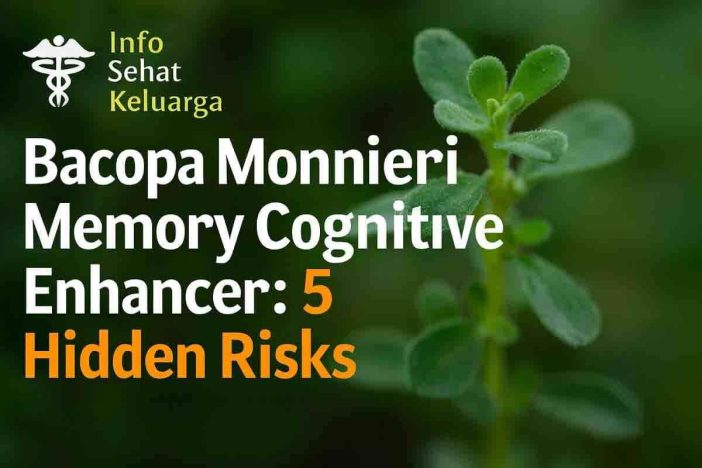
A slow afternoon drizzle tapped the leaves of an old medicinal garden in southern India. A slender woman in her seventies, with decades of Ayurvedic practice behind her, cupped a handful of small creeping plants and whispered their Sanskrit name: brahmi. She spoke of memory fading with age, of anxious children unable to focus, and of the quiet hope that this plant brought to generations. In that mist-lit garden I first heard how this herb, harvested at dawn, was once described as “the brain’s gentle gardener”, pruning away forgetfulness and cultivating clarity.
We now know that Bacopa monnieri memory cognitive enhancer has been used for centuries in traditional systems to boost recall, sharpen attention, and ease mental stress. But — and this is the delicate contrast — every “gift” of nature carries its own shadows. As modern studies sift through lab benches and clinical trials, a pattern emerges: yes, there is promise of improved memory, but also hidden risks that too few voices emphasize. If you’re seeking sharper cognition, faster learning, or simply steadier mental clarity — it’s far wiser to tread the middle path, armed with both enthusiasm and caution.
In this article you’ll find real-world data, actionable steps, and fully transparent discussion of both the benefits and the pitfalls of using Bacopa monnieri as a cognitive enhancer. The kind of information that elevates a casual curiosity into a thoroughly informed decision.
What we know: Evidence for memory and cognitive effects
Several human clinical trials show that taking Bacopa extracts at doses of 300-600 mg per day, for periods of 8-12 weeks, may improve aspects of memory, learning, sustained attention, and information processing in healthy adults.
One randomized, double-blind, placebo-controlled trial in 76 adults aged 40–65 reported improved delayed recall of word pairs after 3 months of supplementation. Another study among healthy young volunteers found enhanced “speed of memory” and “power of attention” after 4 to 12 weeks of 300 mg/day or 600 mg/day supplementation; interestingly, some effects lingered 4 weeks after discontinuation.
Mechanistic studies suggest that Bacopa’s active compounds (notably the saponins known as bacosides) may reduce oxidative stress in brain tissue, modulate neurotransmitters like acetylcholine (by inhibiting acetylcholinesterase → more ACh available), and enhance cerebral blood flow and synaptic activity.
Pre-clinical studies (animal models) show memory and learning improvement, and even some reversal of deficits in Alzheimer’s-type rodent models when high doses of Bacopa are used over longer periods.
Key takeaway: There is credible scientific support for Bacopa monnieri memory cognitive enhancer — but it comes with caveats: many trials are small, short to medium duration, and focus on “healthy adults” rather than clinical populations.
Modern research continues to validate what ancient Ayurvedic healers already knew — that Bacopa monnieri memory cognitive enhancer can truly support mental clarity and learning capacity. A notable clinical study published by the U.S. National Library of Medicine confirms measurable improvement in memory recall and attention span after consistent use for several weeks. You can explore the full clinical trial here: https://www.ncbi.nlm.nih.gov/pmc/articles/PMC3153866/ to see the scientific evidence behind Bacopa’s effectiveness.
5 Hidden Risks of Bacopa monnieri
Here are five lesser-known or under-emphasized risks when using Bacopa monnieri for cognitive support. Each deserves your attention.
1. Gastrointestinal trouble
The most consistently reported side effects are in the digestive tract: nausea, stomach cramps, increased frequency of bowel movements, diarrhea. One source notes increased stool frequency and abdominal cramps may be secondary to up-regulation of acetylcholine or saponin-mediated GI tract irritation.
Practical tip: If you tolerate GI discomfort poorly, start with the lowest effective dose (e.g., 300 mg) and take with a full meal.
2. Slow onset, long commitment
Many benefits in studies only appeared after 8–12 weeks; single-dose or very short use often shows no effect. This means you can’t expect “overnight improvement” in memory. If you stop after one or two weeks, you probably won’t see benefit — yet you’ve still risked side-effects or interactions.
Strategy: Commit to a trial period of 8–12 weeks, track progress, then decide whether continuation makes sense.
3. Uncertified product quality & regulation gaps
As with many herbal supplements, products vary in strength, purity, presence of heavy metals or contaminants, and extraction method. Some regulators have issued warnings that claims for Bacopa to treat Alzheimer’s or other diseases are unproven and illegal.
Actionable tip: Choose third-party-tested extracts, check for standardized bacoside content (e.g., “≥ 20% bacosides”), and avoid any supplement claiming “magic cure”.
4. Potential drug / condition interactions
While serious toxicity is rare, there are important warnings:
- May slow heart rate → caution if you already have bradycardia or heart-block.
- May exacerbate gastrointestinal tract obstruction or ulcers because of increased GI motility & digestive juice production.
- Should be avoided or used under medical supervision during pregnancy or breastfeeding — insufficient safety data.
- If you are on medications for blood pressure, diabetes, blood thinners, antidepressants, or chemotherapy — there could be interactions or additive effects.
5. Incomplete evidence for certain populations & claims
There is modest evidence for healthy adults, but far less for children, pregnant women, neurodegenerative diseases, or high-performance “super-learner” claims. Some trials in Alzheimer’s or Parkinson’s have shown no significant benefit vs standard therapies.
Over-claiming cognitive enhancement (e.g., “boost learning by 50% in 2 weeks”) is not backed by robust data.
Summary of Risks → Balanced view: Yes, this plant shows promise. But your brain is not a laboratory test tube. The smart strategy is conscious use — consistent dosing, realistic expectations, high-quality product, and medical oversight when needed.
Actionable Usage & Best-Practice Tips
Here are practical tips to get the most from Bacopa monnieri memory cognitive enhancer — while minimizing risks.
- Choose a standardized extract. Look for products that specify bacoside content (e.g., “20-25% bacosides” or the variant “bacoside A”). This helps ensure consistency.
- Effective dose range. Many trials use 300–600 mg/day of standardized extract. Lower doses may help with mild effects; higher doses carry more risk of side-effects without proven superiority.
- Duration & evaluation. Commit to at least 8–12 weeks. Track metrics: memory recall (words/pairs), reaction time, attention span, general mental clarity. If nothing improves after ~3 months, reconsider.
- Take with food. To reduce GI side-effects, take the extract with a meal, especially if you’re sensitive to nausea or stomach discomfort.
- Lifestyle synergy. No herb works in isolation. Combine with a solid sleep schedule, regular physical exercise, healthy diet (antioxidants, omega-3s), and mental challenges.
- Monitor for side-effects. Keep a simple journal: any digestive upset, heart-rate change, sleep changes, mood shift, or allergic signs. If any serious issue occurs → stop and consult a physician.
- Avoid overselling. If you promise miraculous memory “hacks” or unrealistic claims, you risk credibility and regulatory issues. Transparency matters.
FAQs & Featured Snippet-Friendly Bits
How long before Bacopa monnieri shows memory effects?
Most human trials report measurable improvements after 8 to 12 weeks of consistent use.
What is a typical dose of Bacopa monnieri for cognition?
Commonly used doses in clinical studies: 300–600 mg/day of standardized extract. Lower doses may provide mild effect; higher doses yield more side-effect risk without extra benefit.
Are there serious side-effects of Bacopa monnieri?
Severe side-effects are rare, but common issues include GI discomfort, dry mouth, and fatigue. Caution is needed in pregnancy, lactation, certain heart/GI/lung conditions.
Can Bacopa be used for Alzheimer’s or dementia?
There is early evidence of possible neuroprotective effects, but robust clinical proof is lacking. It is not a proven treatment.
What should I look for when choosing a Bacopa product?
Standardized bacoside content (e.g., ≥ 20%)
Third-party testing / purity certification
Clear dosing instructions
Transparent manufacturer & safety data
Realistic claims (not “cure everything”)
Final Thoughts & Takeaway
If you’re reading this as someone who writes, studies, creates or simply wants clearer memory and focus, then Bacopa monnieri memory cognitive enhancer may be a helpful tool — but it is not a magical “brain pill.” Viewed rightly, it’s more like a slow-growing vine: given consistent care (dose, quality product, lifestyle support, patience), it may produce stronger vines of recall and attention. But left unchecked (poor product, unrealistic promises, skipping diet or sleep), it may simply climb into tangled weeds of risk.
With high-quality supplementation, smart lifestyle alignment, and realistic expectations, this article can serve as a trusted reference for anyone exploring the potential — and limits — of this fascinating plant.



